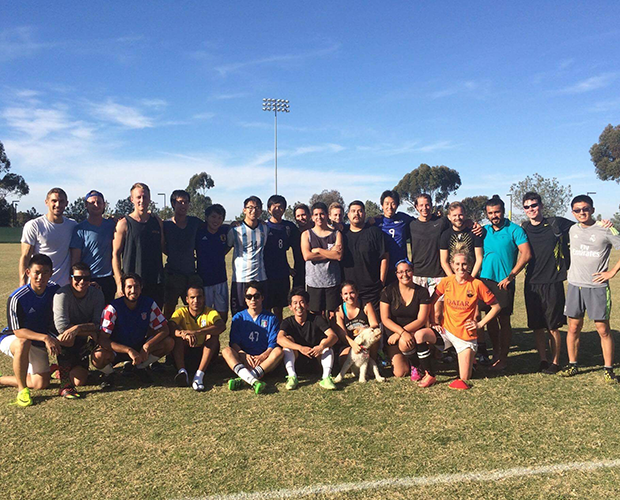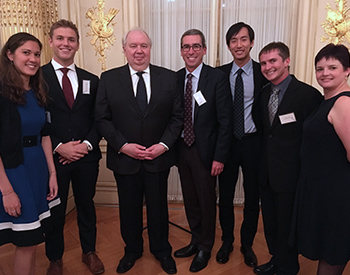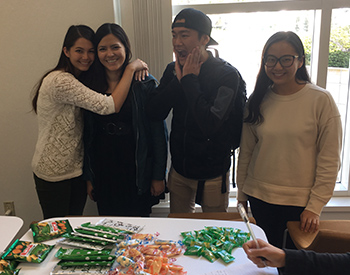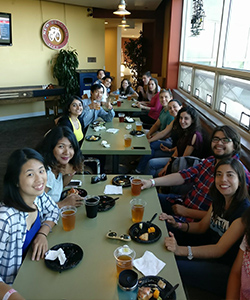Why GPS: Genuine support for your future career

As part of an ongoing series, we give students the creative liberty to opine on their favorite memories from the School and “why GPS” is a solid fit to pursue their graduate education
Dec. 5, 2016 | By Samuel Huang, 2018 MIA candidate | GPS News
Coming from a small liberal arts college, I knew participating in a diverse and close-knit community was essential to my education and what I wanted to do in life. Learning about the cultures of international students and the lived experiences of those at the margins of society motivated me to pursue a career combining international affairs and public service, thus bringing me to the MIA program at the UC San Diego School of Global Policy and Strategy (GPS).
To be truthful, GPS’s distance from Washington, D.C., initially was a worry due to my career aspirations. I had set my sights on East Coast schools, but financial considerations were the ultimate factor. Now that I’ve experienced what it’s really like to be here, I can frankly say it was the right decision. I cannot see myself more fulfilled anywhere else.
As someone interested in East Asia, I have also been impressed by the number of connections the School brings to students through its research centers such as the 21st Century China Center and Japan Forum for Innovation and Technology.
In addition, my class includes a cohort of Japanese ministry employees, which the Japanese program has leveraged as language partners for us. That connection with classmates brings me back to what I view as GPS’s greatest strength and, indeed, the most important thing about going back to school: community. 
In the grand scheme of things, academic quality won’t differ much among top schools. Whatever coursework you took years ago doesn’t matter much in the long arc of your career. Ultimately, it’s the relationships and opportunities to learn from the diverse experiences of your peers—who here have taught me so much about Thai politics, Japanese policymaking and even Latin dance—as well as belonging to a loyal network of alumni who continuously give back through career advice, internship/job postings, resume referrals and will continue to support and stay with you for life.
 I didn’t know what to expect coming here. Students at peer schools in D.C., seemed to be stressed about internships and coursework. There was definitely more of a competitive, type-A culture to get ahead. I understand what it means to complete a “professional” degree, but I strongly disagree that it has to be soul-crushing. Thus, I have been grateful to find just how friendly GPS is.
I didn’t know what to expect coming here. Students at peer schools in D.C., seemed to be stressed about internships and coursework. There was definitely more of a competitive, type-A culture to get ahead. I understand what it means to complete a “professional” degree, but I strongly disagree that it has to be soul-crushing. Thus, I have been grateful to find just how friendly GPS is.
Faculty, students and staff are genuinely supportive and open to each other in a way reminiscent of my treasured liberal arts college experience. This is due in large part not to our California sunshine and beaches right off campus, but an institutionalized culture: things such as first-year students being assigned second-year mentors, or second-years surprising first-years with unbeknownst annual traditions after our first exams.
Whether it’s a Saturday afternoon or a weekday late night, I find myself going to the newly renovated student lounge just to say, ‘Hi,’ because I know I will always bump into a friendly face there. And the abundant funding for student clubs greatly enriches student life despite how busy we all are—countless events with free beer never hurts.
 Lastly, even though I had heard that Career Services pulled more than their weight to help students, I was still surprised by just how much they care about our futures. The career advisers will constantly send us alumni-connected internship postings (under email headings such as “Thanksgiving gifts”) and regularly respond to emails at odd nonworking hours.
Lastly, even though I had heard that Career Services pulled more than their weight to help students, I was still surprised by just how much they care about our futures. The career advisers will constantly send us alumni-connected internship postings (under email headings such as “Thanksgiving gifts”) and regularly respond to emails at odd nonworking hours.
I have learned so much from weekly career talks from alumni eager to share their experiences at places such as U.S. Agency for International Development, the Department of Treasury and Qualcomm. During the annual “Internship Extravaganza” event, second-years share their summer internship experiences with students, with panels equally divided between government, private sector, think tanks and multilaterals/development organizations.
Although hesitant before coming here, I have never once felt disadvantaged by our distance from D.C., in terms of pursuing government opportunities. Our alumni network in D.C., may be smaller than those of D.C., schools, but the quality of the connections more than makes up for the quantity. Our Career Services team work so hard to connect us to alumni, who have helped refer my resume to employers such as the Department of Commerce or provided advice about working at the Environmental Protection Agency, Government Accountability Office and Export-Import Bank.
The community and Career Services are distinct yet almost hidden strengths of GPS that separate us from other schools. It is for those two reasons that I am so grateful to be here.
I knew GPS’s niche lay in its curricular focus on Pacific Rim countries and rigorous quantitative skills. Of course, we have superstar faculty at the top of their fields in Professors Susan Shirk, Barry Naughton, David Victor and Stephan Haggard.

